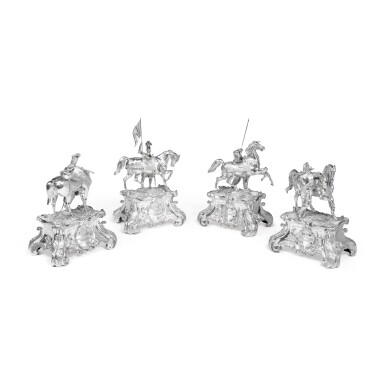European Silver, Furniture and Ceramics
European Silver, Furniture and Ceramics

Property from the Collection of Mr. Joseph Segal
A Rare Set of Four Victorian Silver Horse and Rider Sculptures, John S. Hunt for Hunt & Roskell, London, possibly designed and modeled by Alfred Brown, 1861
Lot Closed
October 20, 08:14 PM GMT
Estimate
80,000 - 120,000 USD
Lot Details
Description
A Rare Set of Four Victorian Silver Horse and Rider Sculptures, John S. Hunt for Hunt & Roskell, London, possibly designed and modeled by Alfred Brown, 1861
depicting Joan of Arc, a Charles I cavalier, a Saracen, and a modern Victorian cavalry officer, each accompanied by his or her mount, on shaped rectangular rococo bases centered by armorial cartouches, numbered 9499 (Joan and cavalier) and 2499 (Saracen and soldier), Joan figure stamped under base "Hunt & Roskell late Storr Mortimer & Hunt"
323 oz 5 dwt
10,058 g
heights excluding spear or banner approx. 12 1/2 in.
31.8 com
Ann, Countess Cowper (1809-1880)
David Orgell, Beverly Hills, 1978
Possibly International Exhibition of 1862
These four figures were made to be en suite with a larger pair of equestrian figures by Hunt & Roskell (see previous lot and extensive note), exactly reproducing their Rococo Revival bases. The larger figures, which may have been inspired by sculptures in the gardens at Wrest Park, were made for Thomas, 2nd Earl de Grey (d. 1859), and inherited by his daughter Ann, Countess Cowper. It was she who lent the pair to Hunt & Roskell's display at the 1862 International Exposition, and it would have been she who commissioned these additional and matching pieces after her father's death.
The larger groups were identifed in Hunt & Roskell's catalogue as having been designed and sculpted by Alfred Brown (c. 1825-1893), and it seems likely they would have called upon him to extend the group, as they were proudly identifiying his work for them in the 1862 catalogue. Given that the four figures were marked in 1861, they may also have been shown at the Exposition, and just not listed individually like the larger groups and testimonials.
